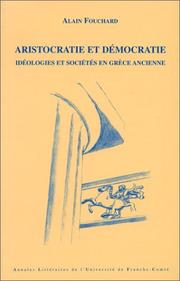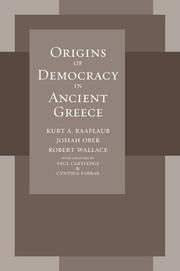| Listing 1 - 10 of 10 |
Sort by
|

ISBN: 2877065561 9782877065566 Year: 2005 Publisher: Paris: Éd. de Fallois,
Abstract | Keywords | Export | Availability | Bookmark
 Loading...
Loading...Choose an application
- Reference Manager
- EndNote
- RefWorks (Direct export to RefWorks)
La démocratie a été inventée, analysée et louée par les Athéniens du Ve siècle avant J.-C. C'était une forme de démocratie particulière : une démocratie directe, dans laquelle chaque citoyen avait la possibilité de participer à toutes les décisions importantes, de façon souveraine. Or ce même Ve siècle est celui où l'on voit apparaître un surgissement sans pareil d'œuvres et de découvertes dans le domaine intellectuel et culturel. Le dernier livre de Jacqueline de Romilly entreprend d'établir un rapport étroit entre l'exercice nouveau de la démocratie et ce soudain épanouissement, qui en fut le prolongement. A la différence de ses livres précédents, Jacqueline de Romilly a largement orienté cet essai vers les problèmes d'aujourd'hui. L'expérience athénienne reste unique, mais la leçon qui se dégage de cette expérience ancienne permet de ranimer l'élan qui a donné d'aussi beaux résultats. Le passé peut ici inspirer l'avenir
Democracy --- History --- Classical Greek Political History --- Greece --- Athens (Greece) --- Democracy - Greece - History --- Democracy - Greece - Athens - History
Book
ISBN: 084767956X 0847679578 9780847679560 9780847679577 Year: 1995 Publisher: Lanham (Md.): Rowman & Littlefield,
Abstract | Keywords | Export | Availability | Bookmark
 Loading...
Loading...Choose an application
- Reference Manager
- EndNote
- RefWorks (Direct export to RefWorks)
Democracy --- Démocratie --- History. --- Histoire --- Greece --- Grèce --- Politics and government. --- Politique et gouvernement --- Démocratie --- Grèce --- Democracy - Greece - History.
Book
ISBN: 9780199697670 0199697671 Year: 2016 Publisher: Oxford: Oxford university press,
Abstract | Keywords | Export | Availability | Bookmark
 Loading...
Loading...Choose an application
- Reference Manager
- EndNote
- RefWorks (Direct export to RefWorks)
Democracy --- Greece --- History --- Politics and government --- Democracy - History --- Democracy - Greece - History - To 1500 --- Greece - Politics and government - To 146 B.C.
Book
ISBN: 2840160757 2821850964 9782840160755 Year: 2010 Publisher: Paris: Presses universitaires de Paris Ouest,
Abstract | Keywords | Export | Availability | Bookmark
 Loading...
Loading...Choose an application
- Reference Manager
- EndNote
- RefWorks (Direct export to RefWorks)
On a beaucoup écrit sur les origines grecques de la démocratie. Mais sait- on que plus de dix siècles avant l’instauration de ce régime dans l’Athènes antique, l’exploitation des terres communes étaient confiée au damos ? Que les rois célébrés dans l’épopée ne se seraient pas risqués à agir sans tenir compte de « l’opinion » du dèmos ? Ou qu’à Olympie, où rivalisait la fine fleur de l’aristocratie grecque chantée par Pindare, on pouvait faire appel d’un jugement de quelques puissants dirigeants devant le dèmos réuni ? À travers l’examen exhaustif et contextualisé de toutes les sources archaïques, se déploie ainsi l’histoire lointaine et méconnue d’un mot, dèmos, des réalités historiques qu’il désigne et des idées qu’il contribue à faire naître. En étudiant la formation des premières communautés de la Grèce antique et les tensions qui les ont traversées, ce livre se présente comme un véritable retour aux sources de notre réflexion politique.
Political Science --- Law, Politics & Government --- Political Theory of the State --- Greece --- Politics and government --- Democracy - Greece - History - Sources --- Democracy --- Démocratie --- History --- Histoire --- Grèce --- Politique et gouvernement --- démocratie --- histoire du droit --- Antiquité Grecque --- Peuple. --- Dî̄mos (le mot grec).

ISBN: 2251606564 9782251606569 Year: 1998 Volume: 656 162 Publisher: Paris: Les Belles Lettres,
Abstract | Keywords | Export | Availability | Bookmark
 Loading...
Loading...Choose an application
- Reference Manager
- EndNote
- RefWorks (Direct export to RefWorks)
Aristocracy (Political science) --- Aristocratie (Science politique) --- Democracy --- History --- Self-government --- Political science --- Equality --- Representative government and representation --- Republics --- Aristocracy --- Démocratie --- Histoire --- Greece --- Athens (Greece) --- Grèce --- Athènes (Grèce) --- Politics and government --- Social conditions --- Politique et gouvernement --- Conditions sociales --- History. --- Aristocracy (Political science) - Greece - History - To 1500. --- Democracy - Greece - History - To 1500. --- Aristocracy (Political science) - Greece - History - To 1500 --- Democracy - Greece - History - To 1500 --- Aristocratie --- Democratie --- Grece ancienne --- Antiquite

ISBN: 0520245628 9780520245624 Year: 2007 Publisher: Berkeley (Calif.): University of California press,
Abstract | Keywords | Export | Availability | Bookmark
 Loading...
Loading...Choose an application
- Reference Manager
- EndNote
- RefWorks (Direct export to RefWorks)
This book presents a state-of-the-art debate about the origins of Athenian democracy by five eminent scholars. The result is a stimulating, critical exploration and interpretation of the extant evidence on this intriguing and important topic. The authors address such questions as: Why was democracy first realized in ancient Greece? Was democracy "invented" or did it evolve over a long period of time? What were the conditions for democracy, the social and political foundations that made this development possible? And what factors turned the possibility of democracy into necessity and reality? The authors first examine the conditions in early Greek society that encouraged equality and "people's power." They then scrutinize, in their social and political contexts, three crucial points in the evolution of democracy: the reforms connected with the names of Solon, Cleisthenes, and Ephialtes in the early and late sixth and mid-fifth century. Finally, an ancient historian and a political scientist review the arguments presented in the previous chapters and add their own perspectives, asking what lessons we can draw today from the ancient democratic experience. Designed for a general readership as well as students and scholars, the book intends to provoke discussion by presenting side by side the evidence and arguments that support various explanations of the origins of democracy, thus enabling readers to join in the debate and draw their own conclusions.
Democracy --- History --- Greece --- Athens (Greece) --- Politics and government --- Politics and government. --- Démocratie --- Histoire --- Grèce --- Athènes (Grèce) --- Politique et gouvernement --- Self-government --- Political science --- Equality --- Representative government and representation --- Republics --- Democracy - Greece - History - To 1500 --- Democracy - Greece - Athens - History - To 1500 --- Greece - Politics and government - To 146 B.C. --- Athens (Greece) - Politics and government
Book
ISBN: 9780199982158 0199982155 1306291275 0199355258 0199982163 9780199982165 0190879521 9780190879525 Year: 2014 Publisher: Oxford [etc.] Oxford University Press
Abstract | Keywords | Export | Availability | Bookmark
 Loading...
Loading...Choose an application
- Reference Manager
- EndNote
- RefWorks (Direct export to RefWorks)
In this careful and compelling study, Ryan K. Balot brings together political theory, classical history, and ancient philosophy in order to reinterpret courage as a specifically democratic virtue. Ranging from Thucydides and Aristophanes to the Greek tragedians and Plato, Balot shows that the ancient Athenians constructed a novel vision of courage that linked this virtue to fundamental democratic ideals such as freedom, equality, and practical rationality. The Athenian ideology of courage had practical implications for the conduct of war, for gender relations, and for the citizens'self-image as democrats. In revising traditional ideals, Balot argues, the Athenians reimagined the emotional and cognitive motivations for courage in ways that will unsettle and transform our contemporary discourses. Without losing sight of political tensions and practical conflicts, Balot illustrates the merits of the Athenian ideal, provocatively explaining its potential to enlarge our contemporary understandings of politics and ethics. The result is a remarkable interdisciplinary work that has significant implications for the theory and practice of democracy, both ancient and modern.
Courage. --- Conduct of life. --- Democracy --- Courage --- Morale pratique --- Démocratie --- History. --- Histoire --- Athens (Greece) --- Athènes (Grèce) --- Politics and government --- Early works to 1800 --- Politique et gouvernement --- Ouvrages avant 1800 --- Demokratie. --- Ideologie. --- Politische Planung. --- Mut. --- Democracy. --- Political science. --- Griechenland. --- Athen. --- Greece. --- Greece --- Athens (Greece) -- Politics and government -- Early works to 1800. --- Democracy -- Greece -- History. --- Conduct of life --- Philosophy --- Philosophy & Religion --- Ethics --- History --- Politics and government. --- Self-government --- Political science --- Equality --- Representative government and representation --- Republics --- Ethics, Practical --- Morals --- Personal conduct --- Philosophical counseling --- Bravery --- Courageousness --- Dauntlessness --- Fearlessness --- Heroism --- Intrepidity --- Intrepidness --- Valiance --- Valiancy --- Valiantness --- Valor --- Valorousness --- Heroes --- E-books --- Démocratie --- Athènes (Grèce) --- Athens (Greece) -- Politics and government -- Early works to 1800 --- Democracy -- Greece -- History --- Histoire. --- Morale pratique. --- Early works to 1800.
Book
ISBN: 9782130555797 2130555799 Year: 2007 Volume: *28 Publisher: Paris: Presses Universitaires de France,
Abstract | Keywords | Export | Availability | Bookmark
 Loading...
Loading...Choose an application
- Reference Manager
- EndNote
- RefWorks (Direct export to RefWorks)
Corruption --- Denunciation (Criminal law) --- Democracy --- Dénonciation (Droit pénal) --- Démocratie --- History --- History. --- Histoire --- Greece --- Grèce --- Politics and government --- Politique et gouvernement --- Malicious accusation --- Dénonciation (Droit pénal) --- Démocratie --- Grèce --- Accusation, Malicious --- Torts --- Simulation of crimes --- Criminal law --- Self-government --- Political science --- Equality --- Representative government and representation --- Republics --- Malicious accusation - Greece - History - To 1500 --- Democracy - Greece - History - To 1500 --- Denunciation (Criminal law) - Greece - History - To 1500 --- Greece - Politics and government - To 146 B.C

ISBN: 3515069518 9783515069519 Year: 1997 Volume: 107 Publisher: Stuttgart: Steiner,
Abstract | Keywords | Export | Availability | Bookmark
 Loading...
Loading...Choose an application
- Reference Manager
- EndNote
- RefWorks (Direct export to RefWorks)
History of ancient Greece --- Democracy --- Démocratie --- History. --- Histoire --- Greece --- Grèce --- Politics and government --- Politique et gouvernement --- -Self-government --- Political science --- Equality --- Representative government and representation --- Republics --- History --- -Democracy --- -History --- -History of ancient Greece --- Démocratie --- Grèce --- Griechenland --- Hellas --- Yaṿan --- Vasileion tēs Hellados --- Hellēnikē Dēmokratia --- République hellénique --- Royaume de Grèce --- Kingdom of Greece --- Hellenic Republic --- Ancient Greece --- Ελλάδα --- Ellada --- Ελλάς --- Ellas --- Ελληνική Δημοκρατία --- Ellēnikē Dēmokratia --- Elliniki Dimokratia --- Grecia --- Grčija --- Hellada --- اليونان --- يونان --- al-Yūnān --- Yūnān --- 希腊 --- Xila --- Греция --- Gret︠s︡ii︠a︡ --- Democracy - Greece - History. --- -Athenes (grece) --- Histoire ancienne --- Democratie --- Athenes (grece)

ISBN: 0520925769 1281752428 9786611752422 1429440090 052093217X 1433700018 9780520932173 9781281752420 9781429440097 9780520245624 0520245628 Year: 2007 Publisher: Berkeley University of California Press
Abstract | Keywords | Export | Availability | Bookmark
 Loading...
Loading...Choose an application
- Reference Manager
- EndNote
- RefWorks (Direct export to RefWorks)
This book presents a state-of-the-art debate about the origins of Athenian democracy by five eminent scholars. The result is a stimulating, critical exploration and interpretation of the extant evidence on this intriguing and important topic. The authors address such questions as: Why was democracy first realized in ancient Greece? Was democracy "invented" or did it evolve over a long period of time? What were the conditions for democracy, the social and political foundations that made this development possible? And what factors turned the possibility of democracy into necessity and reality? The authors first examine the conditions in early Greek society that encouraged equality and "people's power." They then scrutinize, in their social and political contexts, three crucial points in the evolution of democracy: the reforms connected with the names of Solon, Cleisthenes, and Ephialtes in the early and late sixth and mid-fifth century. Finally, an ancient historian and a political scientist review the arguments presented in the previous chapters and add their own perspectives, asking what lessons we can draw today from the ancient democratic experience. Designed for a general readership as well as students and scholars, the book intends to provoke discussion by presenting side by side the evidence and arguments that support various explanations of the origins of democracy, thus enabling readers to join in the debate and draw their own conclusions.
Democracy --- Self-government --- Political science --- Equality --- Representative government and representation --- Republics --- History --- Athens (Greece) --- Greece --- Politics and government. --- Politics and government --- Democracy -- Greece -- History -- To 1500.. --- Democracy -- Greece -- Athens -- History -- To 1500.. --- Greece -- Politics and government -- To 146 B.C.. --- Athens (Greece) -- Politics and government. --- academic. --- ancient greece. --- ancient historian. --- ancient history. --- ancient world. --- athenian democracy. --- athens. --- cleisthenes. --- cultural history. --- cultural studies. --- easy to understand. --- ephialtes. --- greek culture. --- greek democracy. --- greek government. --- greek history. --- philosophical. --- political philosophy. --- political science. --- political scientist. --- political. --- politics. --- scholarly. --- social change. --- social history. --- social studies. --- solon.
| Listing 1 - 10 of 10 |
Sort by
|

 Search
Search Feedback
Feedback About UniCat
About UniCat  Help
Help News
News